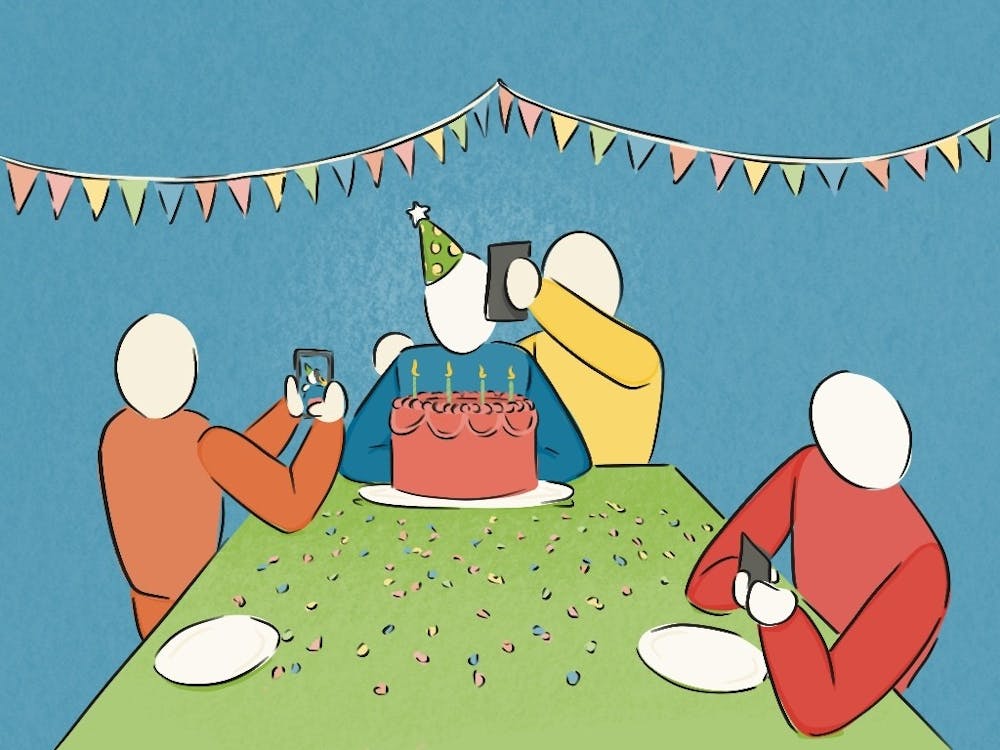2.5 hours. During that time one could watch an entire movie, do a workout, read a novel, paint a painting, bake cookies, write a story or an immense number of other things. Time offers endless possibilities, yet for many people, social media is what these hours are spent on.
In 2022, the average social media usage of worldwide users amounted to about 147 minutes per day, or two hours and 27 minutes. This is the highest it has ever been, overcoming 2021’s 145 minutes.
Not everyone will hit that mark, however, USC students spend a variety of different times on social media.
Freshman Sophia Maggiacomo claims to spend at least five hours on all social media apps per day, while Sophomore Claire Smith explains that changing her social media settings has enabled her to spend less time on these apps.
“I’d probably say [I spend] one to two hours total,” Smith said. “I have all of my notifications off for all of my social media apps, so I feel like that makes me inclined to go on them less. It’s more an end of the day checking Instagram sort of thing.”
While Maggiacomo spends much more time on social media, she genuinely enjoys the content she is sharing, especially when it is an inspirational message.
“It’s for me as much as it is for other people,” Maggiacomo explained. “If something speaks to me, I’m like ‘Oh, that’s going on my story.’ Or like if it’s just a positive message in general, I feel like I'll usually put it on my story.”
The amount of time spent on these apps fluctuates day to day for a person, and with this also comes a change in mood.
When she is on social media for an extended period, Maggiacomo thinks of herself as in an “instant gratification mood,” explaining that there is an impact on her focus and work ethic.
“If I’m on Tik Tok for like an hour and then I go to try and do homework, and say I have to do 15 questions for homework, I’ll definitely just bullshit and answer the questions in a very short or simple ‘just get the point across’ away,” Maggaicomo said.
Freshman Lucelia Himmer explains that when she goes on social media, it is usually when she needs a “pick-me-up.” This goal, however, is usually not achieved after scrolling.
“I feel like it drains my energy even though I go to it to boost my energy,” Himmer said.
Despite the potential for these negative impacts, social media is still a very prevalent factor in modern life. It is often used to capture moments and experiences, share them and connect with others.
For college students, this connection can be an important factor in staying in touch with people back home.
“It's a way to connect with my friends who I’m not with at that moment, but I would tell if I was there in person,” Himmer said of sharing her experiences on social media.
Maggiacomo agrees, expanding on how the desire to show her hometown friends how "good" her life at college is, pushes her to post.
“Especially now coming to South Carolina, there’s a lot of people, like my home friends, that I want to post for to show them I’m having a good time or all about my life,” Maggiacomo said.
Sophomore Abby Robisch believes that capturing memories and experiences can have benefits as well. For her, this shines through her YouTube channel.
Robisch has been compiling an online scrapbook for herself for the past 6 years on YouTube, with vlogs and montages from various trips holding many wonderful memories.
This does come at a price though, and Robisch relents that always being the “one with the camera out” can remove her from the moment itself.
“I do think at times it can kind of take over you being in the moment,” Robisch said. “When I was in Europe I was kind of more focused on capturing what I was doing so that I could remember it later rather than actually soaking it in.”
She is not alone in this mindset. Smith also explains that, in the past, she was very focused on capturing quality content of her having a good time in an effort to share on social media platforms later.
“I used to get disappointed if I was doing something fun and didn’t get an ‘Instagram-worthy’ picture,” Smith said. “I’d feel disappointed in myself because it was like, did I even really do it?”
This shifted later down the road, when she was on a trip and upset because none of the pictures met her standards.
“I was like ‘Well, why was I even trying to take pictures?’ I realized I was trying to take pictures to post them and not just to have them for memories later down the road,” Smith said.
This realization came with a desire to adjust her mindset. Instead of focusing on curating the perfect Instagram post, Smith now chooses to scrapbook her memories.
“I remember I went to Eastern Europe in high school with some friends and we made a big scrapbook of our trip,” Smith said. “I realized that I preferred just looking at that with them rather than just looking at my posts from that trip.”
While scrapbooking is one way to change your focus from taking pictures for social media to taking them for your own memories, polaroid film cameras can have the same benefit.
Maggiacomo specifically enjoys how they don’t provide as many distractions.
“If I’m with my friends and then I go on my phone, even to just take a picture, I still feel like I’m going ‘on my phone.’ And then I’m like, ‘Oh, what’s on Instagram, who’s snap-chatting me?’” But if I whip out my film camera to just take a picture, then it’s that simple, it’s done,” Maggiacomo explained.
Himmer agrees with this point, commenting on how during the summertime, the lack of service at the beach along with the abundance of disposable cameras she owns helps her stay in the moment.
“If there’s a cool thing happening, I’ll take an actual picture. It’ll save the moment but it won’t interrupt it,” Himmer said.
So, if there are other ways to capture memories that don’t invoke the negative side effects of social media, why do we post on these apps at all?
Let’s take a Carolina Gamecocks Gameday, for example.
You get dressed up in your Gamecock merchandise, ready to cheer on our team, but before you get too sweaty or forget, it’s picture time!
Maggiacomo comments on the fact that the pressure of posting on social media after big social events, therefore enforcing the need to get quality pictures at these events, feeds into the concept of needing to “prove” oneself to others on social media.
“You’re not going into it to enjoy the moment. You are going into it for a purpose for social media to show your friends that you are having a fun time, I guess,” Maggiacomo said. “It’s like you constantly have something to prove. There’s an expectation to show that you are having a good time, even when you might truly not be.”
Himmer agrees with this, explaining that at the end of the day, these experiences you are trying so hard to prove are “good” are being tarnished by the need to capture them.
“You are interrupting those moments to prove to other people that you’re having a great life, where I feel like, in a perfect world, you should be proving to yourself that you have a great life and that you enjoy it and you’re enjoying the moments,” Himmer said.
Robisch expands on this, explaining that we are not in Himmer’s perfect world and that the societal norms of this constant-sharing lifestyle are what keep the cycle moving forward.
“I don’t know if it is ever something we will get out of just because of the expectations of social media…” Robisch said. “I think everyone at some point is posting or taking pictures or doing something for other people in the eyes of social media.”
While we are still living in this culture, there are some things a person can do to continue posting, but in a healthier manner.
Maggiacomo believes a person should take their time during the moment and only share content after it has happened.
“I feel like that after part is always important, because you have to kind of reflect on your experience,” Maggiacomo said.
Himmer is placing more emphasis on other things in her life to bring her joy, rather than relying on social media.
“One of my goals this year is to work more on my hobbies and stuff that genuinely makes me happy, even if it’s just like reading a book or something,” Himmer said. “I feel like I get more out of that than doing a little addictive-like post, and then seeing the views, and then being like ‘Oh my god, should I have posted that? Should I not have?’”
As social media norms are a product of modern society, Smith believes this is where the change must begin if we hope to ever see a difference.
“I think when everyone has the mindset that they have to share everything that they’re doing it makes it harder,” Smith said. “I think that if we are to ever live fully in the moment as a society again, it would be valuable if we could take a step back and look at social media and how it can change our perception.”



